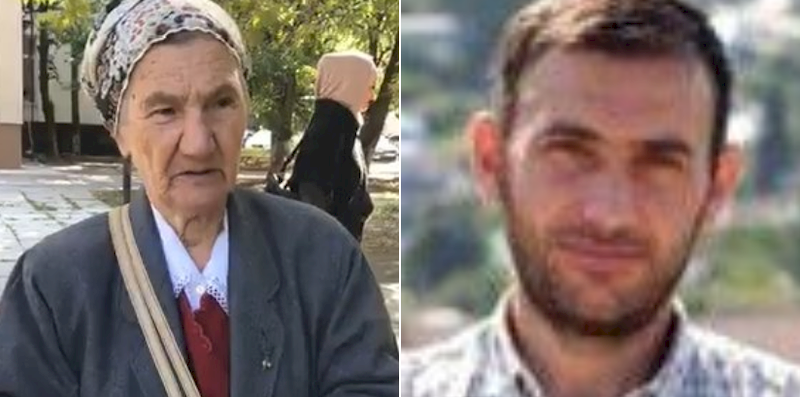Mothers and children of Crimean Tatar political prisoners frighten judges in Russian-occupied Crimea

With press freedom severely curtailed, and lawyers prohibited from divulging any information about the charges their clients face, Russia probably expected the lawlessness of its indefinite imprisonment and ‘trials’ of Crimean Tatars and other Crimean Muslims to go unnoticed. Crimea is not Russia, however, and there will be no silence, however much the de facto judges try to hold all hearings behind closed doors, and however many Crimean Tatars are themselves arrested for showing solidarity.
As well as four Crimean Tatars already serving long sentences in Russia, there are now 21 men facing ‘terrorism’ charges for alleged involvement in the peaceful Hizb ut-Tahrir movement which is legal in Ukraine and whose ‘terrorist’ label in Russia was never explained. A further four Crimean Tatars have been arrested, accused of involvement in the apolitical and peaceful Tablighi Jamaat movement which Russia banned as ‘extremist’ in 2009. In virtually all the cases, armed and masked men have burst into the homes of law-abiding and devout Muslims, waved their automatic rifles around before terrified children and taken their fathers away in handcuffs.
The involvement is unproven, as are any grounds for the alleged ‘terrorist’ or ‘extremist’ nature of the organizations, yet ‘convictions’ by Russian courts are virtually guaranteed, and the Russian-controlled courts never question applications for detention.
Attempts were made from the outset to frighten people away from attending detention hearings. The people who came could end up themselves summoned for questioning, and there was a police officer who made no attempt to conceal the fact that she was videoing everybody present.
People refused to be intimidated, and now the majority of such hearings are behind closed doors. Children desperately hoping to at least see their fathers when they’re brought into the court are often even prevented from entering the court building.
So too were the elderly mother and wife of 46-year-old Muslim Aliev whose detention on October 5 was extended in a closed court hearing by ‘judge’ Anatoly Osochenko.
Aliev’s mother spoke outside the court, explaining that “all people on this earth have the same rights, all of them. You must not denigrate a person’s human dignity. There is nothing more important, more valued than a human being. Yet what is going on here? What are they turning people into?”
Both she and Muslim’s wife, Nadzhiye are clear that the courts are closed because the judges are afraid of such words. As well as because they don’t want the families and others to know anything about the case.
Sergei Legostov, Aliev’s lawyer, came out after the hearing to say that the detention of his client and of Enver Bekirov had been extended for a further two months. He too believes that the court hearings are closed only because the FSB and ‘judges’ don’t want to see the families and a large number of other people come to show support for the men held prisoner without any grounds.
He told the family that Aliev had addressed the court firmly and confidently, saying “I am innocent, have never committed any terrorist acts and will prove this”.
The brutal truth of these prosecutions, however, is that no terrorism is required to sentence men to huge terms of imprisonment.
Russia’s Supreme Court declared Hizb ut-Tahrir ‘terrorist’, and the fact that it never provided any grounds for so labelling an organization not known to have committed a single terrorist or violent act is simply immaterial.
Mere ‘involvement’ in the organization is enough.
Less will do, since a secret witness prepared to claim that the person tried to ‘recruit’ him or spoke about a world Khalifate in front of him, is deemed quite sufficient ‘proof’ of such involvement.
As well as working at two or more jobs for many years to pay for expensive medical treatment for one of his daughters, Aliev was also the informal leader of a local Muslim community. The latter had come into conflict with the Muftiat on a number of occasions, and his family is convinced that this is the reason that he was arrested on February 11, 2016. His is one of the two cases, together with that of human rights activist Emir-Usein Kuku, that Amnesty International highlighted in its report on Crimea. (more details about his arrest and the likely motives here).
Each of the FSB’s so-called ‘Hizb ut-Tahrir trials’ requires one ‘organizer’ and a certain number of men accused only of being ‘involved’. In the so-called Yalta case, Aliev has been designated ‘organizer’ and faces a sentence of 17 years or longer. Human rights activist Emir-Usein Kuku; Vadim Siruk; Envir Bekirov; Arsen Dzhepparov and Refat Alimov face 10-year sentences (or longer) for supposed involvement.
In January 2017, the prosecution suddenly laid new charges of “attempting violent seizure of power in Russia’ with this carrying a near-guaranteed 8-year increase in sentence (from 20 years to life).
If Muslim Aliev and Emir-Usein Kuku have, up till now, been the most obvious cases where men have been targeted for their human rights or civic activism, that changed on October 12. Of the six men from Bakhchysarai arrested after the latest wave of armed searches, at least two are civic activists involved in Crimean Solidarity, the civic initiative which arose from the need to support Crimeans imprisoned on trumped up charges. The message is devastatingly cynical – you too risk imprisonment for up to two decades for showing solidarity in the face of injustice.





